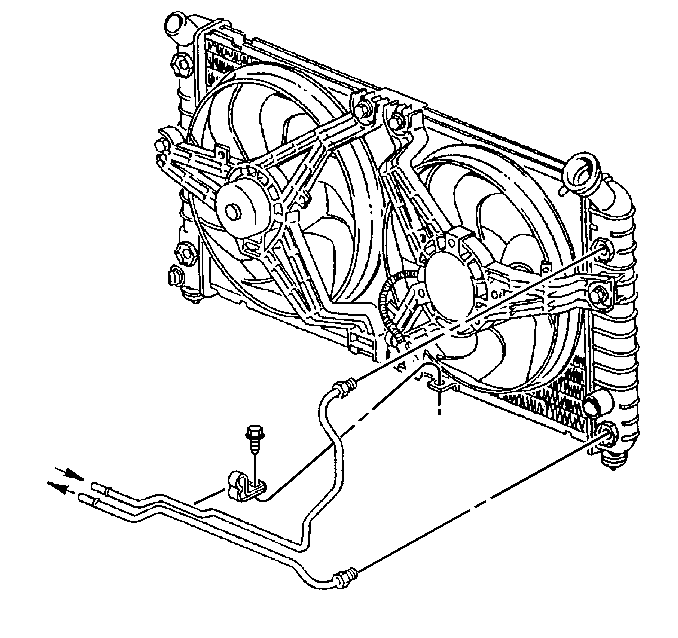Use only double-wrapped and use only brazed steel pipe meeting the GM specification 123M or equivalent if replacement of the transaxle oil cooler pipes are required. Ensure the pipe is double-flared.
Removal Procedure
Notice: Allow sufficient clearance around the transaxle oil cooler pipes and around the hoses to prevent damage or wear which may cause fluid loss.
- Raise and support the vehicle. Refer to
Caution: To help avoid personal injury when a vehicle is on a hoist, provide additional support for the vehicle at the opposite end from which components are being removed. This will reduce the possibility of the vehicle falling off the hoist.
in General Information. - Position the drain pan.
- Remove the transaxle oil cooler hoses from the pipes. Refer to Automatic Transmission Oil Cooler Hose Replacement .
- Remove the transaxle oil cooler pipe fittings at the radiator.
- Remove the transaxle oil cooler pipe clip bolt.
- Remove the transaxle oil cooler pipes.

Installation Procedure
- Install the transaxle oil cooler pipes.
- Install the transaxle oil cooler pipe clip bolt.
- Install the transaxle oil cooler pipe fittings at the radiator.
- Install the transaxle oil cooler hoses to the pipes. Refer to Automatic Transmission Oil Cooler Hose Replacement .
- Remove the drain pan.
- Lower the vehicle.
- Adjust the fluid level.
- Inspect for proper completion of the repairs.
- Inspect for fluid leaks.

Important: The correct thread engagement is critical. Crossthreaded fittings can achieve proper tightness value and still leak.
Tighten
Tighten the transaxle oil cooler pipe clip bolt to 4 N·m
(27 lb in). Refer to
Notice: Use the correct fastener in the correct location. Replacement fasteners must be the correct part number for that application. Fasteners requiring replacement or fasteners requiring the use of thread locking compound or sealant are identified in the service procedure. Do not use paints, lubricants, or corrosion inhibitors on fasteners or fastener joint surfaces unless specified. These coatings affect fastener torque and joint clamping force and may damage the fastener. Use the correct tightening sequence and specifications when installing fasteners in order to avoid damage to parts and systems.
in General Information.Tighten
Tighten the transaxle oil cooler pipe fittings to 45 N·m
(33 lb ft).
Notice: Do NOT overfill the transaxle. The overfilling of the transaxle causes foaming, loss of fluid, shift complaints, and possible damage to the transaxle.
